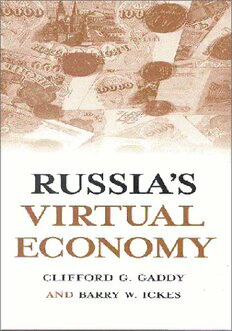
Russia's Virtual Economy PDF
321 Pages·2002·1.267 MB·English
Most books are stored in the elastic cloud where traffic is expensive. For this reason, we have a limit on daily download.
Preview Russia's Virtual Economy
Description:
Clifford Gaddy's and Barry Ickes's paradigm of the "virtual economy" has forced broad recognition of the inadequacies of the intended market reform policies in Russia. Their thesis - that Russia's economy is based on illusion or pretence about nearly every important economic yardstick, including prices, sales, wages and budgets - also sought to provide a framework for understanding how and why so much of Russia's economy has resisted reform. Gaddy and Ickes now use the virtual economy concept to project the near- and middle-term future of the Russian economy and suggest possible policy responses. Drawing on new empirical material from published and unpublished sources and from their own field of work in Russia, the authors examine critical aspects of the virtual economy: manufacturing enterprises, households and the public sectors, both local and federal. They also integrate the financial and agricultural sectors into their model.
See more
The list of books you might like
Most books are stored in the elastic cloud where traffic is expensive. For this reason, we have a limit on daily download.
